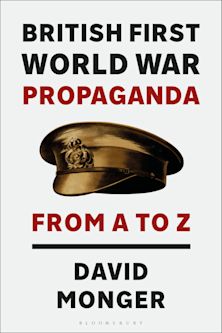- Home
- ACADEMIC
- History
- First World War
- Germany and Propaganda in World War I
Germany and Propaganda in World War I
Pacifism, Mobilization and Total War
Germany and Propaganda in World War I
Pacifism, Mobilization and Total War
You must sign in to add this item to your wishlist. Please sign in or create an account
Description
Adolf Hitler, writing in Mein Kampf, was scathing in his condemnation of German propaganda in World War I, declaring that Germany failed to recognise that the mobilization of public opinion was a weapon of the first order. This, despite the fact that propaganda had been regarded by the German leadership, arguably for the first time, as an intrinsic part of the war effort. In this book, David Welch fully examines German society - politics, propaganda, public opinion and total war - in the Great War. Drawing on a wide range of sources - posters, newspapers, journals, film, Parliamentary debates, police and military reports and private papers - he argues that the moral collapse of Germany was due less to the failure to disseminate propaganda than to the inability of the military authorities and the Kaiser to reinforce this propaganda, and to acknowledge the importance of public opinion in forging an effective link between leadership and the people.
Table of Contents
Introduction
Days of Decision: Germany on the Eve of War
The Mobilization of the Masses
War Aims
The Crucible of War
Dissenting Voices: Pacifism, Feminist Ferment and the Women's Movement
War Aims Again
Civilians 'Fall-In'
Defeat and revolution
Conclusion: 'The Sins of Omission'
Product details
| Published | 01 Aug 2014 |
|---|---|
| Format | Ebook (PDF) |
| Edition | 1st |
| Extent | 384 |
| ISBN | 9780857724717 |
| Imprint | I.B. Tauris |
| Illustrations | 48 bw integrated |
| Publisher | Bloomsbury Publishing |
About the contributors

ONLINE RESOURCES
Bloomsbury Collections
This book is available on Bloomsbury Collections where your library has access.


































